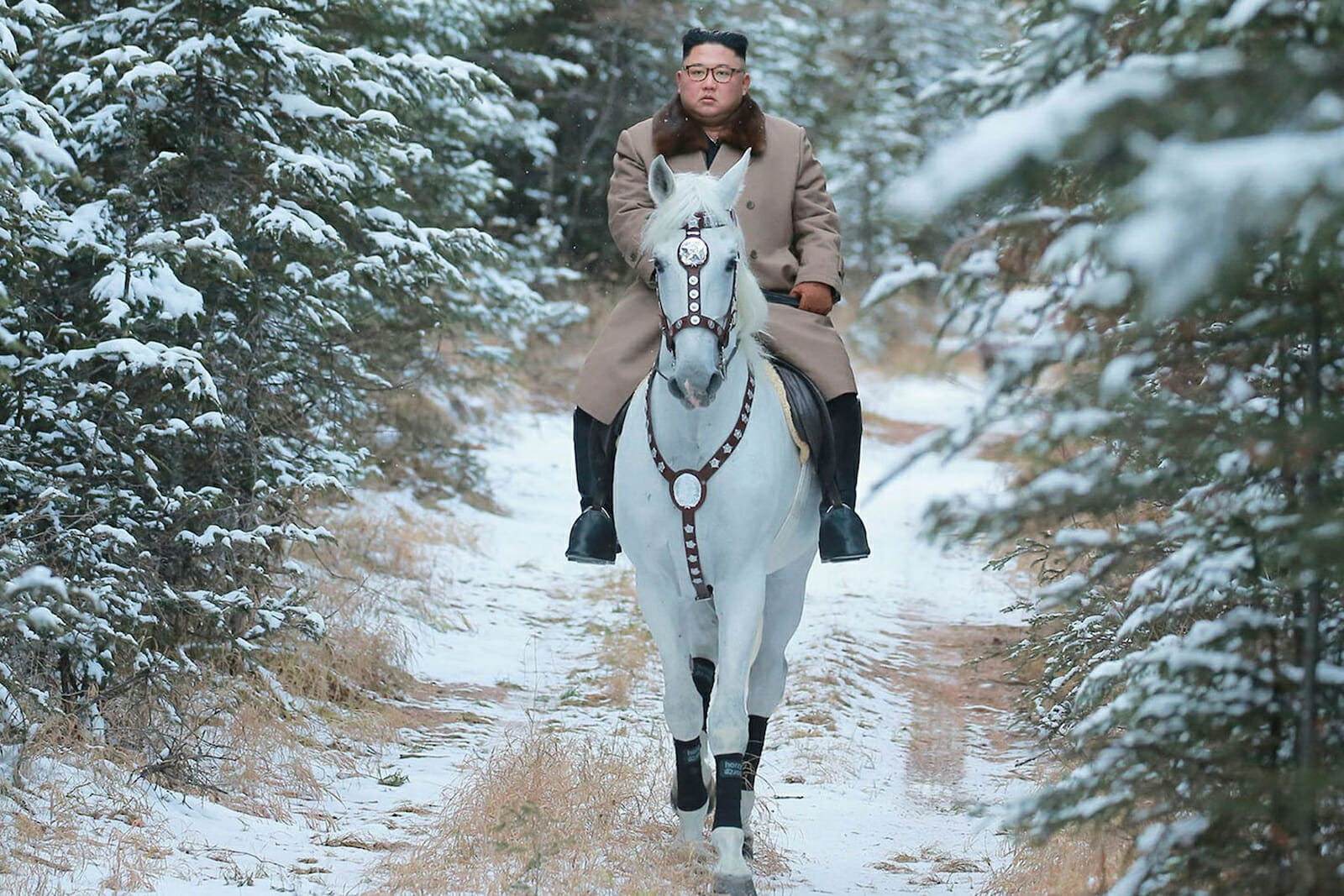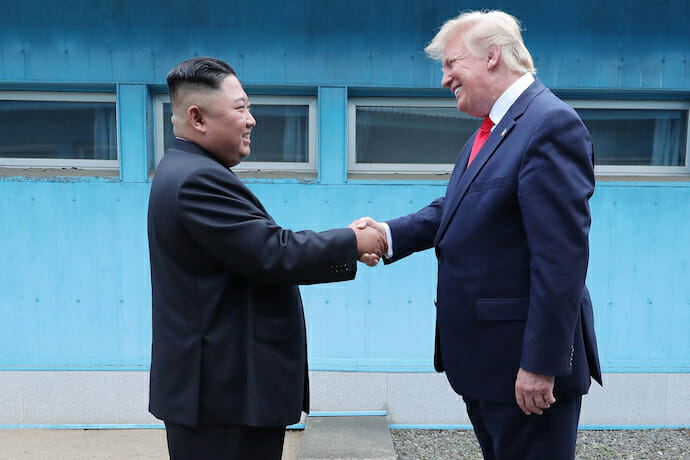
U.S.-North Korea Relations in 2019: ‘Up is Down’
Nearly a year and a half ago, President Trump presented an unanticipated diplomatic move: he became the first sitting U.S. president to convene a summit with a sitting North Korean dictator at Singapore’s Capella Hotel. There, both leaders signed a joint statement, in which “the DPRK commits to work toward complete denuclearization of the Korean Peninsula.”
Since then, I have asked myself many times, especially these last few months, if “up” has seemingly become “down” for U.S.-North Korea relations. As of now, I am much more inclined to say yes. For one, Pyongyang has reminded Washington of its impending end-of-year deadline to lay a solution that North Korea can formally accept, and it has conducted over a dozen missile tests this year. Additionally, they have hinted that it is up to Washington to decide what “Christmas gift” they will receive from Pyongyang—a portentous sign that they may launch a long-range missile during the Christmas holidays, or in early 2020.
In December alone, Pyongyang has confirmed that it has made tremendous strides in elevating their weapons system by administering a few tests at their Sohae Satellite Launching Ground on December 7th and December 13th. Furthermore, U.S. Ambassador to the United Nations, Kelly Craft, summoned a meeting on December 11th, addressing her deep concerns regarding Pyongyang’s intransigence, and indicated Pyongyang’s missile launches as a “clear violation of UN Security Council resolutions.” Lastly, North Korea’s state media, KCNA, confirmed on December 22nd that Kim Jong-Un convened a meeting with top military personnel from his Workers’ Party, where he stressed a great need for enhanced military readiness.

All that has transpired in December suggests that bilateral relations between Washington and Pyongyang have deeply soured since the Singapore Summit. Having said that, to better understand how relations have plateaued, it is equally important to recollect the momentum that the Trump administration, particularly Trump himself, had to initiating diplomacy with North Korea. This year, Trump has continually demonstrated that he still has a penchant for being mercurial with engaging with Kim.
First, on February 5th, Trump devoted one short paragraph of his State of the Union Address to illustrate what he interprets as the unparalleled progress that he and his administration has made in engaging in dialogue with North Korea so far. Additionally, he also announced his upcoming meeting with Kim Jong-Un in Hanoi, Vietnam on February 27th and 28th. What was not expected were the end results of this Hanoi Summit: it ended abruptly without an agreement. At the press conference, Trump iterated that Pyongyang insisted on the lifting of all sanctions, but he emphasized that he could not make concessions with Kim, as it was not the right time to do so.
Though the Hanoi Summit ended without a deal, it only took a few short months for both leaders to exchange letters to each other. Less than a week before Trump’s planned visit to Osaka, Japan for the G-20 Summit, North Korea’s state media, KCNA, announced that Kim received a letter from Trump, and “said with satisfaction that the letter is of excellent content.” Naturally, speculation arose that the two leaders may convene an impromptu meeting. On June 28th, Trump even invited Kim to meet at the Demilitarized Zone (DMZ) via Twitter, because he also planned a trip to Seoul after the G-20 summit:
After some very important meetings, including my meeting with President Xi of China, I will be leaving Japan for South Korea (with President Moon). While there, if Chairman Kim of North Korea sees this, I would meet him at the Border/DMZ just to shake his hand and say Hello(?)!
— Donald J. Trump (@realDonaldTrump) June 28, 2019
As predicted, Trump’s capricious tendencies prevailed, and he became the first sitting president to cross the demarcation line on June 30th, and once again, reinforced his friendship with Kim.
Since the history-making “meeting” at the DMZ, there has been a continued impasse between Pyongyang and Washington. In an effort to ameliorate stalled negotiations, high-level talks resumed in Stockholm in early-October, which akin to the Hanoi Summit, ended abruptly. According to Kim Myong-gil, North Korea’s chief negotiator, Washington remains inflexible in its approach to improving U.S.-DPRK relations. Meanwhile, the State Department confirmed that while Pyongyang and Washington do not completely see eye-to-eye in their approaches to making a comprehensive solution, Sweden, which happens to be the protecting power for the United States in North Korea, offered to host another set of high-level negotiations two weeks later. The two sides did not reconvene in Stockholm, and no high-level discussions have occurred since then.
While bilateral talks in the latter half of 2019 have mostly faltered, this also begs me to ask whether or not North Korea will ever make meaningful and comprehensive steps towards denuclearization. If we must be transparent, one thing would most likely need to occur for this to be possible: an internal realization will need to be made by the Kim regime that their weaponry and their self-imposed isolation from the international community pose a greater threat to their existence rather than a long-term security guarantee. Unless this realization becomes actualized by the Kim regime, Pyongyang will perpetuate its strategy of provocation by expanding its nuclear capabilities. Moreover, and more importantly, it will continue to commit heinous crimes of humanity by depriving its people of basic human rights, which is why, for example, the State Department reinstated North Korea as a Country of Particular Concern for its gross disregard of religious freedom on December 18th. Truthfully, it is highly unlikely that Pyongyang can be convinced to change its outlook on its nuclear weapons, because it may mean that they would need to undergo a process that, perhaps, would result in an eventual complete, verifiable, irreversible dismantlement (CVID) of their isolation. In other words, to Kim, the opening of North Korea’s borders would be an existential threat to his regime’s survival.
As we enter a new year and a new decade, if Washington hopes to produce any sort of long-term deliverables when it comes to engaging with North Korea, human rights concerns must be properly addressed in any future high-level negotiations, or for any future legislation passed that are meant to target the Kim regime. As Dr. Victor Cha illustrated in one of his recently-published essays, “historically, human rights have not played a large role in U.S. negotiations with North Korea, yet they are critical to any future credible and comprehensive agreement with North Korea.” At this point in time, the onus is on the U.S.-Asia policymaking community to recommend and employ effective policies that will place diplomatic pressure on North Korea to take responsibility for violating international treaties and for circumventing sanctions. Moreover, Washington needs to implement policies that also prioritize human dignity for the North Korean people. After all, as one of the world’s preeminent defenders of freedom and liberty, it behooves the United States to remain unyielding in promoting these values both domestically and abroad, especially in the Indo-Pacific region.

